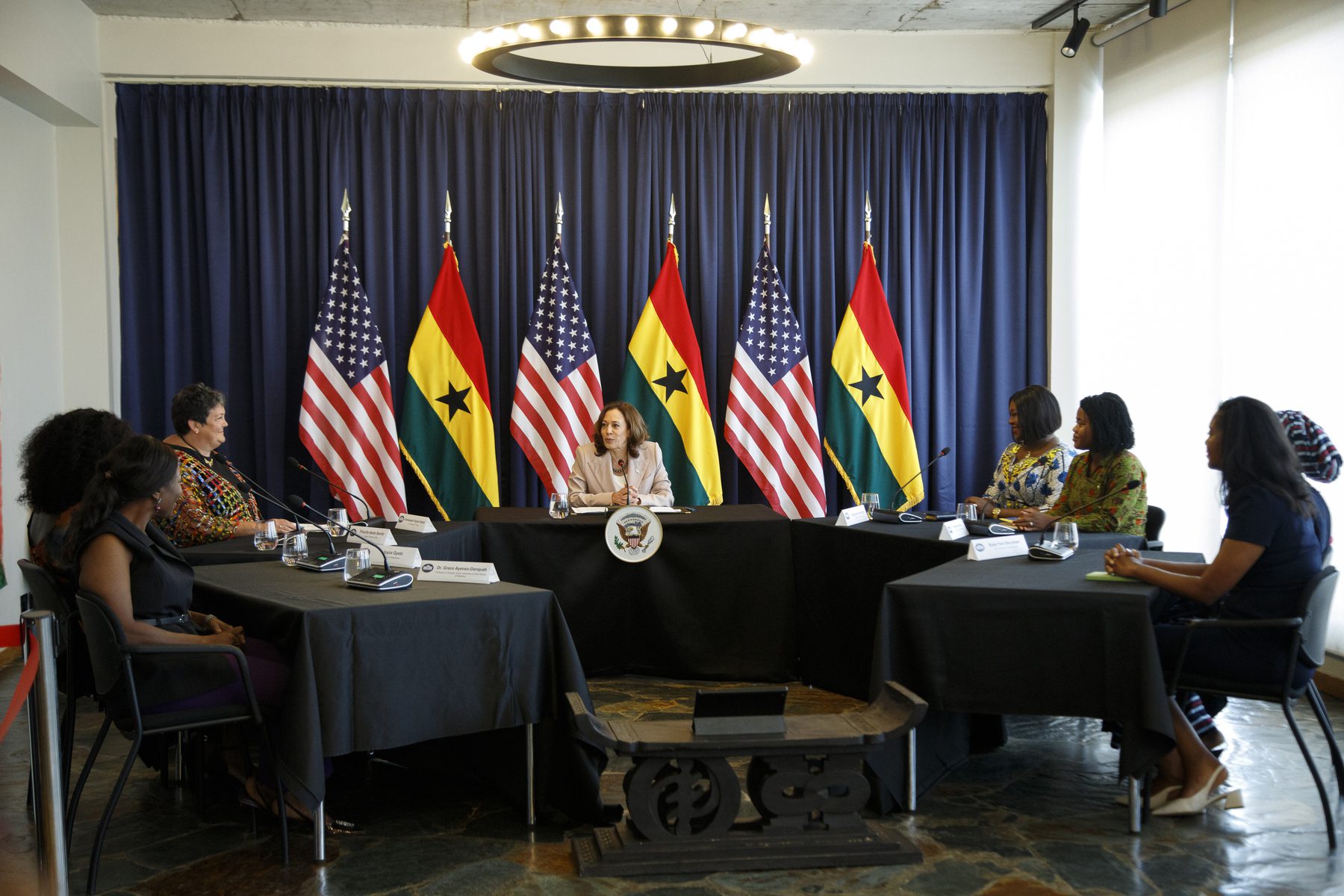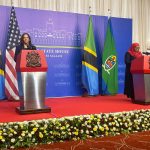Become a more informed member of our evolving electorate. Subscribe to The Amendment, a new biweekly newsletter by Errin Haines.
ACCRA, Ghana — Vice President Kamala Harris wrapped up a three-day state visit in Ghana on Wednesday, hosting a roundtable focused on women’s economic empowerment in the country and underscoring the administration’s commitment to the issue more broadly on the African continent.
Harris met with five Ghanaian women entrepreneurs in fields including medicine, farming, climate, economics and culture at The Mix Design Hub, a woman-owned restaurant, gallery and coworking space. It coincided with the announcement of commitments of public and private funds worth about $1 billion to help close the gender gap in access to the Internet in Africa and help women further their participation in the economy.
“The investments that I have outlined, we believe will help build a future where women are not just treated equally but are able to thrive, where women have the opportunity to lead, and a future simply put where there will be no barriers for the ability of women to participate in the economy, where they can enjoy freedom from violence and equal access to health care and education, and where they can shatter every glass ceiling,” Harris said Wednesday.
Several of the Black women business leaders smiled and nodded their heads in agreement Wednesday morning as Harris again emphasized the importance not only of women’s inclusion but also their leadership as key to their empowerment and the progress of Ghana, the African continent and around the globe.
“The focus here is on both: inclusion and leadership, understanding that women must have the opportunity and the access to all that is necessary to achieve their goals, their desires, their potential, to also lead,” Harris said.
Harris said that the administration is working to measure the impact of its investment and that she’s “a big believer in metrics.”
“I do believe the window is definitely open now, and I do believe that based on what we do now the window will continue to be open,” she said. “But it will be a function of the investments that we make starting now to create the momentum that is necessary for this approach to endure.”
Harris’ mission on this trip also involves diplomacy, after the previous administration largely did not engage with Africa, with former President Donald Trump referring to some nations as “shithole countries.”
Jennifer Hart, an associate professor of history at Wayne State University, said that while the administration’s tone has changed from recent years, the policy commitments will tell the tale on whether there is real change in relations between the United States and Africa.
“The U.S. controls a lot of global economic policy, and that has enormous implications for African countries and the individuals living in them,” Hart said.
Harris, speaking to reporters after the event, linked women’s equality to democracy and security.
“When you create a system where rule of law is important, equal rights are defended and protected,” Harris said. “You will see greater empowerment of all people, including women, especially if they have been behind or you see extreme disparities. So there’s a correlation there and we’re going to continue to work on it knowing that they’re interconnected.”
Hart said that often the United States and other wealthy countries take a “kind of neocolonial approach” to Africa and that the administration should be thoughtful about what investment looks like regarding women in particular.
“These people are doing amazing stuff; they just need people to get out of their way,” Hart said. “They need access to resources and they need to be listened to, they need to be seen as equals, in a meaningful way. They need the playing field to be a lot more level than it is right now, as a recognition on the part of the United States that it’s not level, it has not been level for two centuries.”
Ghana is the first of three countries Harris, the first woman and African-American vice president, will visit on her historic first trip to the continent as the most powerful Black woman in American politics. She will also travel to Tanzania and Zambia, with a continued focus on gender equality, digital inclusion and democracy.
While in Ghana, Harris has announced a proposed $100 million in aid to help address the threats of violent extremism and instability in Benin, Ghana, Guinea, Côte d’Ivoire and Togo; delivered a major speech on U.S.-Africa relations; and laid a wreath at Cape Coast Castle, a fort that was the last stop for millions of Africans during the slave trade.
Correction: An earlier version of this article incorrectly stated the amount in aid proposed to address the threats of violent extremism. It is $100 million.






